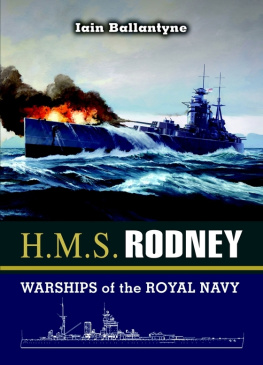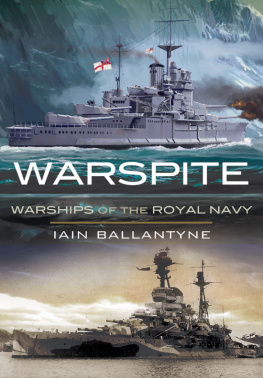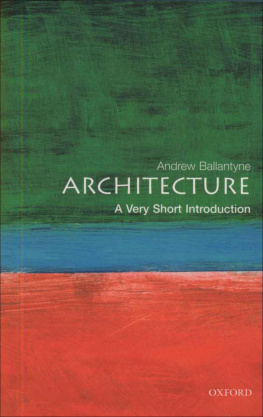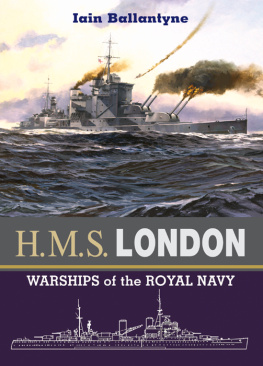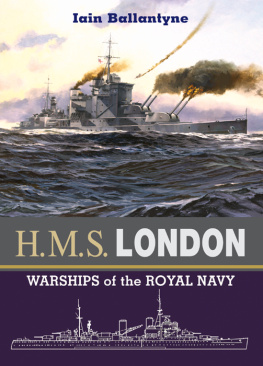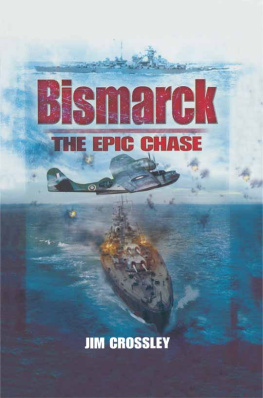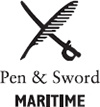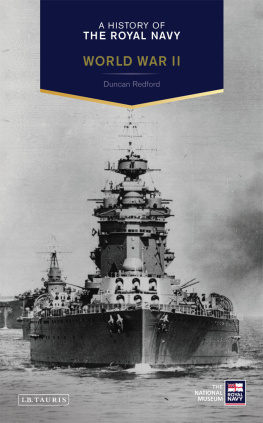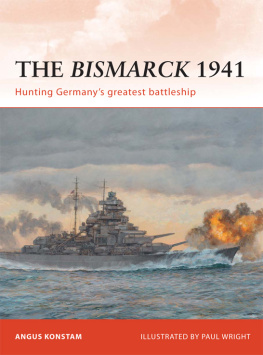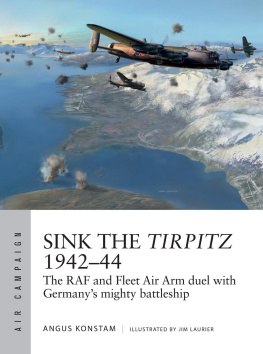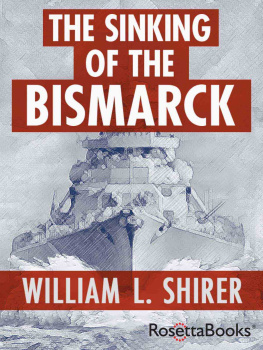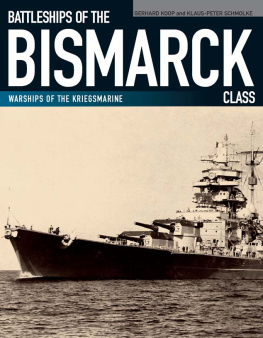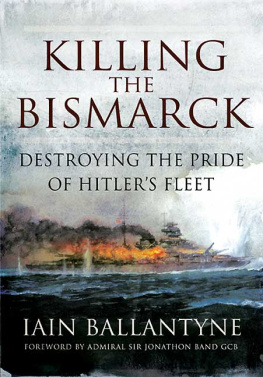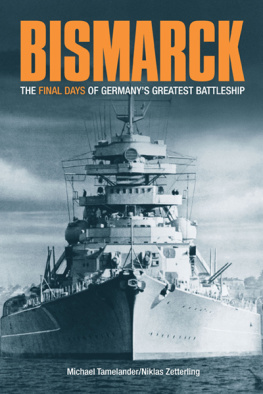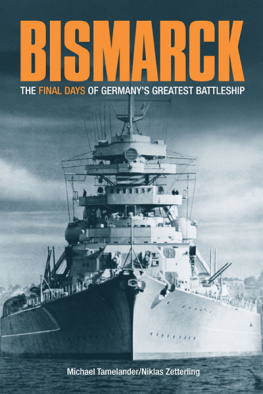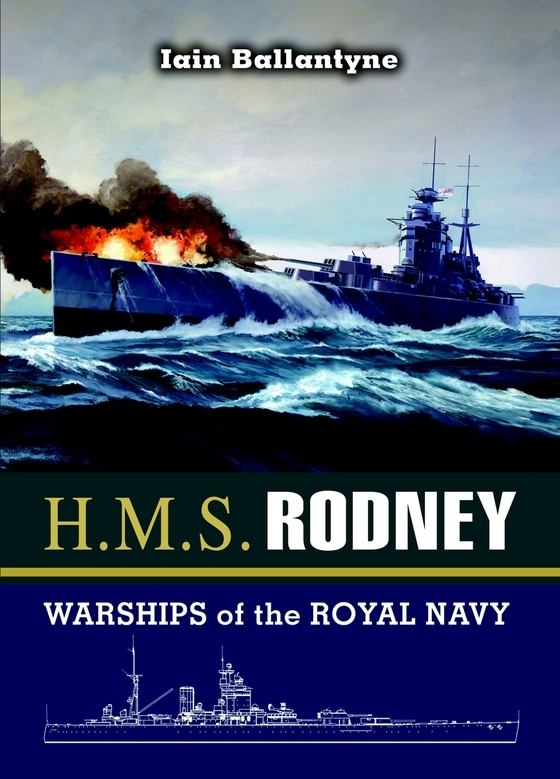ACKNOWLEDGEMENTS
The genesis of this book can be traced back nearly four years, to a dinner party in Plymouth, hosted by Andrew Pearce and his wife Sharon. Knowing my background as an author of books about famous British warships, Andy mentioned that his dad, Derrick, had been Secretary of the HMS Rodney Association (disbanded in 2001). Anyone with even a passing interest in naval history knows that Rodney helped destroy Bismarck and supported the D-Day invasion and I remarked that she would certainly be worthy of a book at some stage. Soon, packages of material from what remains of the HMS Rodney Association archive started arriving, brought up to my house by Sharon, whenever she came up to go running with my wife, Lindsey. And that is how this marathon started, with only a detour to write HMS Victory, third in Pen & Swords Warships of the Royal Navy series, with Jonathan Eastland, in time to be published during the Trafalgar 200 anniversary year. Derrick Pearce has proved an invaluable point of reference at various stages and the material he provided, especially the names and addresses of around 150 Association members, formed a key starting point. The researching and writing of HMS Rodney has absorbed a significant proportion of downtime from my day job, editing WARSHIPS International Fleet Review magazine, and I am indebted to Derek Knoll and HPC Publishing for allowing me the freedom to squeeze this project in.
I often say to my long-suffering wife by way of an apology for periodically abandoning her and my children that I have to write this kind of book now, in order to incorporate fresh eyewitness accounts. For, and I am sure the veterans of the Second World War wont mind me saying this, if I were to ease off now, by the time I come back (perhaps when I am retired) there will not be any veterans left alive. It is the chance to capture in print previously untold stories that gives this book, and previous titles in the series Warspite (2001) and HMS London (2003) their principal value. HMS Victory was obviously an exception. My letters to HMS Rodney Association members led to responses from veterans living not only in the UK, but also in Australia, Canada, the USA and South Africa. Some wrote long, detailed letters, others offered a few background notes and both published and unpublished documents. In many cases I followed up initial contact with one, or more, interviews, either by telephone or (depending on time available and distance) in person. Large or small, mentioned specifically or not, interviewed or incorporated in some other way, they all informed and educated me and therefore propelled the narrative of the book as well as providing vivid stories to enliven proceedings. In some cases, both veterans and their families were involved in helping me out. I would like to extend my thanks to them all and the following in particular:
Jack Austin, Charles Barton, Tom Brock, Harry G. Farmer, Phil Fordham, Ken and Brian George, Ian Hamilton, Rupert Hardwell, Robert G. Jackson, Ernie Johnson, Arthur and Simon Kavanagh, Phil Lancett, Bill MacKinlay, James McLean, Roger Morris, Len Nicholl, Tony Robinson and his daughter Lindy Pritula, Les Sadler, Alan and Nigel Sharp, Allan and Jack Snowden, Frank Summers, Rev. Gordon Taylor, John and Peter Wells-Cole.
Jack Austin mailed me a richly detailed 21-page letter, from his home in New South Wales, which ended, appropriately enough, with a rather salty sentence:
Iain, you have cost me a bloody fortune in tea bags and smokes but the memories were worth it.
I hope all the veterans will agree that Jacks tea and cigarettes were worth it.
Roger Morris deserves a further mention for writing the excellent Foreword to this book, and also allowing full access to his impressive Midshipmans Journal, from which I extracted quotes and illustrations. Rogers patience and willingness to support the cause over the past few years have been the epitome of indefatigability. Similarly deserving of an extra salute, is Allan Snowden who, like Roger, never failed to answer my questions as fully (and cheerfully) as he could, plus also forwarded a sizeable amount of material from his own Rodney archive. Canadian Paul Maddison has been a staunch supporter throughout, his British grandfather Clifford Woolley having served in the battleship during the Second World War. Paul very generously offered the use of photographs from his familys private collection, as well as helping me with obtaining an image from a Canadian archive. He also provided assistance with some areas of research, including a Crew List for the ship. Paul runs a superb HMS Rodney web site (see Appendices). Among those veterans and others connected with the HMS Rodney Association, whom I would like also to thank for helping me one way or the other are: Dennis Berry, Bob S. Bright, Barbara Dadds, Stuart Fletcher, Diane Jackson, Ron Kingdon, W. MacJean, Mike Mackay, George Paddon, Keith Parker, Mr W.G. Phillips, Mrs E. Pink, Mrs M.E. Skidmore, R. Thomas, Henry L. Thompson.
As regards all those others who responded, but whom I have inadvertently forgotten to mention, please accept my sincere apologies and heartfelt thanks.
Rodney veteran Peter Staveley, some of whose papers are lodged in the Imperial War Museums Department of Documents, very kindly provided supplementary material for which I am extremely grateful. Sadly, some who started out on the journey have not made it, including Ted Russ, whom I interviewed in Plympton one cold November evening and who provided me with some excellent research material and a couple of photographs. Sadly he passed away before this book could be published, as did fellow Rodney veterans Hugh Cooley, Bob Pink and Bill Skidmore. Another casualty was Syd Goodman, my good friend and naval history adviser, but, like the veterans, he lives on in the spirit of this book. Some of battleship Rodneys deceased shipmates made their contributions via their children, who have kept the flame of memory burning bright, most notably: Kevin Byers, who supplied me with his father Tommys very vivid accounts of his time in Rodney, also forwarding relevant photographs; Lesley Evetts and Geoff Myers, who graciously agreed to provide not only their father Bills unpublished memoirs, but also photographs from their familys private collection; W. Gordon Campbell, who included his dads recollections in a wonderful document he has lovingly crafted on battleship Rodney. Mrs Mary Watson sent an evocative photograph of her late father, James Thoirs, taken during the period that he served in Rodney. She also passed on a few memories of Rodney connections.
Ray Faulkner went to a considerable amount of trouble to photograph his late fathers Crossing the Line certificate from 1942, which is reproduced in the plates. John Faulkners favourite story of his time in Rodney sprung from the ships 1941 refit at Boston, when, according to Ray, an American family took him to an ice cream parlour and he saw what was to him the worlds biggest Knickerbocker Glory. And he ended up getting it for free for the family, by managing to eat two of them.
It goes to prove that often Rodneys men blotted out the blood and thunder of other episodes with happy memories, many of which they have passed on to me, helping to bring alive their incredible stories. When it comes to illustrating this book, there are a number of other people who I should also thank: Stephen Courtney, Curator of Photographs at the Royal Naval Museum in Portsmouth; photographers Nigel Andrews, Dave Billinge and Stephen J. Borg; Kevin and Denise Goodman, for allowing images from the Goodman Collection to be used. It is an honour indeed to include a painting of Rodney by Paul Wright ARSMA (www.paulwrightmaritimeartist.co.uk), whose enthralling work has previously graced books by luminaries such as Patrick OBrian. Museums, libraries and archives played their part in bringing this project to fruition and I would like to take this opportunity to extend my gratitude to the staffs of: National Maritime Museum; Imperial War Museum; Royal Naval Museum; Portsmouth and Plymouth city libraries; Wirral Archives Services (particularly Ava Wieclawska); Merseyside Maritime Museum; Nova Scotia Archives and Records Management; US Naval Historical Center; Western Morning News. The US Naval War College granted me permission to quote from Admiralty signals contained within the book On His Majestys Service by Rear Admiral Joseph H. Wellings, USN (Retd).

